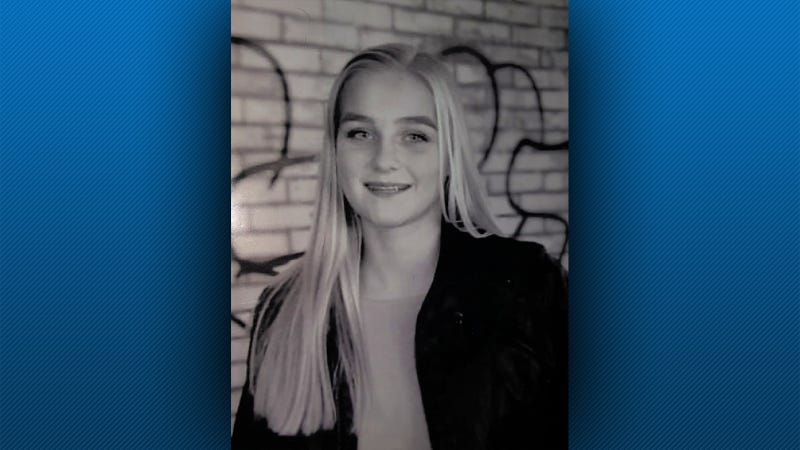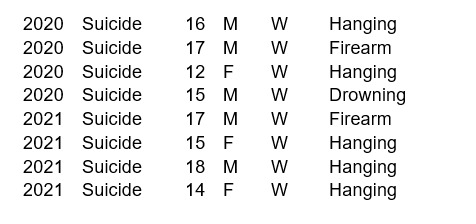
Suicide among children and teens is on the rise. Data published by the CDC shows that during the pandemic, there was a 31% increase in mental health-related Emergency Department visits nationally among adolescents aged 12-17. Among young girls in that age group, there was more than a 50% increase in attempted suicides.
Locally, the data is also alarming. According to the Allegheny County Medical Examiner’s office, at least 7 children and teens died by suicide in the last 18 months.
The youngest was a 12-year-old girl who hanged herself.
Allegheny County suicides among children and teens from January 2020 through June 2021:

Teen and child suicide has been a growing public health concern since before the COVID-19 pandemic. According to the CDC, the national suicide rate for ages 12-25 increased by more than 57% from 2007 to 2018.
According to the American Academy of Child and Adolescent Psychiatry, suicide is the second leading cause of death for children and young adults age 15 to 24. Among younger children, suicide attempts are often impulsive and associated with feelings of sadness, confusion, or anger. Among teenagers, suicide attempts may be associated with stress, self-doubt, pressure to succeed, financial uncertainty, or loss.
Here are some of the top risk factors: depression, family history of suicide attempts, exposure to violence. aggressive or disruptive behavior, access to firearms, bullying, feels of hopelessness or helplessness, acute loss or rejection
Warning signs: Changes in eating or sleeping habits, frequent sadness, withdrawal from friends and family activities, frequent stomachaches or headaches, fatigue, decline in schoolwork, preoccupation with death
Suicide Prevention Programs
School districts across the country are implementing programs to help students cope with anxiety and trauma. The Hope Squad is a national organization, based in Utah, that aims to reduce youth suicide through education, training, and peer intervention.
Hope Squad members are trained to be aware of their peers and watch for warning signs. They learn to show empathy to their peers, listen without judgment, and reduce stigma regarding help-seeking and mental illness.
Hope Squad members recognize the warning signs of suicide, reach out to peers in distress, and refer them to trusted adults. They recognize bullying, intervene, and encourage other students not to be bystanders. They also promote resilience and self-care by hosting annual activities and events during Hope Week.
Dr. Gregory A. Hudnall is founder of the Hope Squad.
He says of the suicide epidemic: “For every young person that dies by suicide, there’s upwards of 100-150 others that attempt.”
Dr. Hudnall says suicidal thoughts, negative feelings, and self-harm begin much younger than you might expect.
“We’re seeing in elementary schools, anxiety, depression, and cutting at ages we would’ve never thought possible.”
The pandemic has worsened mental health concerns, with more students feeling isolated and anxious, and worried they’re missing out on opportunities.
Dr. Hudnall says stereotypes about suicidal teens can be misleading, since struggles with mental health are not limited to any particular family dynamic, or economic, geographic, or ethnic background.
However, there is one common theme: parents of students who attempt suicide rarely see it coming.
“Kids hide it so well. They’ll share it with their best friends, but they hide it from adults, especially their parents,” says Dr.
Hudnall.
How One Family & School District are Working Together
This year the Deer Lakes School District in Allegheny County will become the first in the area to implement the Hope Squad program.
The district has experienced two student suicides in the past two years. One of those students was Maura Rupprecht, who died at the age of 16 on March 18, 2019.
Maura was a varsity soccer player and a member of the high school marching band. Her parents, Molly and Dan, describe her as a “typical teen with a great sense of humor.” Although they say Maura was a private teenager, she had a lot of friends and a wide variety of interests.
“She’d have band practice and then a soccer game. Then on weekends we’d have competitions. She was busy, but she liked it that way,” says Molly.
Molly and Dan Rupprecht never talked with their daughter about suicide because they didn’t realize she was considering it. They did often ask her about school, sports, band, and about her friends, but Maura always told them everything was “fine.” They wish now that they would have dug deeper.
There were no obvious red flags. In fact, the night before Maura died from suicide, her father shared a milkshake with her. Maura even turned in her homework assignment online. The morning she died, her mother texted her to ask her to walk the dog and checked to see how she was feeling since she was getting over a cold. Maura indicated in a text she was feeling a little better.
“And it was probably an hour later that I got a call to come home,” says Molly.
A couple of Maura’s friends found her after going to the house to check on her. They hadn’t been able to get in touch and they became worried.
After the tragedy, friends, family, and even strangers reached out and rallied around the family, asking how they could help.

“I was completely moved by the support that we got from our friends and from people who are now our friends,” says Dan Rupprecht.
The Rupprechts are now on a mission to encourage other families to discuss mental health and suicide more freely. They pray that such conversations will reduce the stigma often associated with suicide.
“The main thing is to get people thinking about mental health and suicide,” says Dan.
Maura’s older brother has always been an avid hockey player. His teammates helped host a hockey tournament fundraiser, which has become an annual event. With the money raised so far, the Rupprechts have worked to bring the Hope Squad to the Deer Lakes School District. Molly first heard about the program while watching a news program on television. They will soon begin working with other districts as well.
“We recognize that so much of what our students need right now is support beyond academics,” says Lindsey McGaughey, Director of Special Education for Deer Lakes School District.
Deer Lakes school administrators already had several mental health programs and resources in place prior to this school year, including teams of staff trained and supported by an outside health care provider. They have 2 full-time mental health professionals and a social worker who regularly meet with students, conduct assessments, and link students and families with resources. They also have a suicide prevention program at the high school to make students aware of suicidal risks and when to ask for help. The Hope Squad will provide students with another layer of detection and prevention, focusing on peer-to-peer engagement and outreach. It couldn’t come at a better time, given the challenges that all school districts have faced since the onset of the COVID-19 pandemic.
“We are seeing more students who are not participating and joining in classes or coming to school when the school buildings are open. We have a lot of students, I think, who are also bearing the weight of supporting their families as well and maybe they also need to be helping with taking care of siblings” says McGaughey. The pandemic has brought even more stressors and led to increased anxiety.
What can parents do?
So is there anything parents can do to recognize then their child or teen may be suicidal? Dr. Hudnall recommends parents ask open-ended and direct questions: Have you ever considered suicide? Have any of your friends? If you were to experience these thoughts, whom would you most likely tell? He also recommends parents create some distance between teens and technology.
“I constantly tell parents when I do training, that at 9:00 at night, please take your child’s phone, put it in the charger, and let them get the sleep that they need and not stress out over worrying about friends,” says Dr. Hudnall.
Molly Rupprecht also recommends families treat suicide discussions like a drill. “Just like you discuss the plan for if your house is on fire, discuss what you would do if you have these (suicidal) feelings.” She also says it’s important to identify someone your children or teens may feel comfortable opening up to, even if it’s not their parents. “Maybe it’s a coach, a teacher, a neighbor, or a friend’s parents.” Just find someone to talk to and then connect with resources that can help.
“We don’t want anyone else to have to go through this.”
MENTAL HEALTH RESOURCES:
HOPE SQUAD… WWW.GRANTUSHOPE.ORG
National Suicide Prevention Lifeline…… 24/7 free and confidential support… 1-800-273-TALK www.suicideprventionlifeline.org
Prevent Suicide PA…..
free trainings and resources for suicide prevention… www.preventsuicidepa.org
The STAR Center, Pittsburgh…. Services for Teens At Risk (RISK), clinical & outreach services to combat adolescent suicide… www.starcenter.pitt.edu
Shape the Sky … featuring current cyber trends and mental health resources… www.shapethesky.org
Shape the Sky Technology Contract… a contract you can use with youth to set expectations about using technology wisely… www.shapethesky.org/technology-contract
The Cyberbullying Resource Center… cyberbullying.org
Stop Bullying… How cyberbullying is different from traditional bullying… www.stopbullying.gov
National Eating Disorders Association… www.nationaleatingdisorders.org
S.A.F.E. Alternatives for Stopping Self Abuse… selfinjury.com
The Demi Brae Cuccia Awareness Organization (Teen Dating Violence)… demibrae.com
National Human Trafficking Hotline… humantraffickinghotmail.org
Ulifeline… mental health resources for college age students … www.ulifeline.org
The Trevor Project… support and crisis intervention for lesbian, gay, bisexual, transgender & questioning youth… www.thetrevorproject.org
